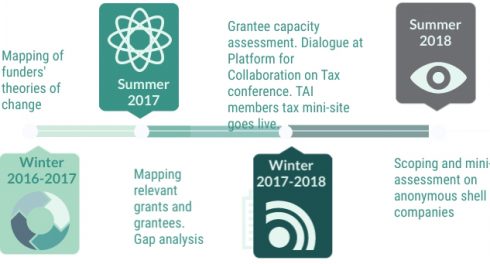 Photo: Rawpixel.com on Pexels
Photo: Rawpixel.com on Pexels
Open Society Foundations (OSF) have long supported transparent and accountability public finance around the globe, but particularly in Africa, where its regional foundations have been very active, including Open Society Initiative for East Africa and Open Society Initiative for Southern Africa (OSISA).
The Transparency and Accountability Initiative (TAI) is a donor collaborative comprised of OSF, the Hewlett Foundation, Ford Foundation, Luminate, MacArthur Foundation, and the UK Department for International Development. TAI’s members aim to better understand how debt trajectories are impacting (and will impact) the work of their grantees on a range of fiscal issues, and how they may align efforts to mitigate adverse effects.
Context
There has been much reporting, discussion, and debate of another looming international debt crisis. Unlike the last international debt crisis, the picture is more complex this time – countries now have multiple sources of debt (multilateral, sovereign lending, corporate bonds and more). This makes it harder to gauge overall debt volumes, but also demands multi-strand responses. According to Jubilee, developing country debt repayments have increased by 85% since 2010. This statistic is unsurprising as according to Afrodad, East African public and publicly guaranteed debt rose 90% between 2010 and 2015, from $33 billion to $63 billion. Similarly, the IMF Fiscal Monitor states that “public debt today is higher than before the global financial crisis.” Worse yet, it is estimated that “40% percent of low-income countries are wrestling with debt distress or high-risk debt levels.”
The lack of transparency in debt management and in some cases, hidden loans, only compound these problems. In 2016, it was disclosed that Mozambique had accumulated over $1 billion of additional debt that was previously unreported because the deals had not been submitted to and approved by parliament as the constitution requires. According to Jubilee, one of the banks involved, VTB Capital’s London branch, has sold their Mozambican debt and it is unclear if it is now owned by vulture funds. This is reminiscent of the Argentine debt crisis, where vulture funds sued the Argentinian government in US courts and won repayment, with profits estimated to be roughly 1,500%. Another dimension of debt is Chinese lending. Jubilee estimates that 20% of African debt is owed to China yet details are limited as neither the China Development Bank nor China ExIm bank disclose terms. Some of the terms may have implications for sovereignty in the case of a failure to keep up with payments, as Sri Lanka’s ceding of the Port of Hambantota shows.
We anticipate that debt servicing demands will create pressures for government policymakers to increase taxation (expediency may reduce any concerns over regressive effects of new taxes) and to reduce public spending, including on development priorities such as health or education. In addition, governments may choose to take out loans to pay off existing debt, so perpetuating the cycle.
Scope of Work
We hypothesize that there is a potential for more collaborative action from debt, tax, and budget groups that can galvanize government action towards this problem. We want to emphasize that we do not want this to be a diagnostic study of debt liabilities (if that is needed, it will be developed separately), but rather a study to understand how grantees see the relevance (or not) of debt to achieving their fiscal programming goals, outline some actions grantees can take to adjust strategies and help improve debt transparency, and recommendations in turn for funders to support those grantees.
Accordingly, the consultant will answer the following interconnected questions based on desk research and interviews. We anticipate the consultant talking to a minimum of twenty TAI member grantee organizations operating in Africa, including those operating in highly indebted country contexts, countries that have avoided overwhelming debt liabilities, and in both lower- and middle-income countries.
- Relevance to Grantees:
- How do grantee organizations perceive the relevance of public debt to their programming priorities, if at all?
- To what extent are they aware of the forms of public debt, debt trajectories, and payment needs?
- Is public debt perceived as of threat to their ability to deliver on priority goals?
- Grantee Strategy and Programming:
- If mounting debt is considered relevant, how is it factoring, if at all, into shifts in grantee strategy and programming approaches
- What are their informational needs? Would more disclosure of public debt liabilities be helpful? If so, in what ways?
- What can be done to incorporate knowledge of debt trajectories and their implications into organizational strategy and programming?
- Collaboration:
- Has there been any grantee collaboration on tackling the issue of public debt (including pushing for greater debt transparency)? What has this collaboration looked like and is there any sense of whether it has been impactful or not?
- What are opportunities for more aligned grantee action to minimize adverse consequences of mounting debt, including in regard to resulting tax and spending decisions?
- Are there opportunities for joint action to increase debt transparency specifically? If so, what?
- What might funders do to enable effective action by individual grantees and collaborative efforts to mitigate negative debt servicing effects on fair, transparent and accountable fiscal outcomes?
Audience and Use
This report will initially be for private consumption of OSF and other TAI members and their grantees, but we anticipate asking the consultant(s) to revise the report for the wider donor community and public consumption. TAI donor members will use this report’s findings to inform future programming around fiscal transparency and hope that grantees will do the same.
Deliverables and Proposed Timeline
For this project, we expect the following deliverables against the specified timeline:
- Inception memo outlining proposed strategy to answer these questions within two weeks of contract signature
- Call with the consultant(s) to discuss early research insights and what best to highlight at OSISA convening – week of June 25, 2019
- Consultant presentation of provisional consultation findings at an OSISA regional debt conference on July 2-3, 2019 in Johannesburg, South Africa (travel costs to be included in cost estimate)
- The OSISA conference will provide an opportunity to validate initial findings and do additional data collection with attending grantees
- One paper up to 20 pages answering research questions and highlighting areas for further research (as useful)
- Full draft for TAI member comment by July 31
- Final version due by September 15, 2019
- A verbal presentation to TAI members synthesizing research and initial findings by September 30, 2019
- A presentation of findings/recommendations at a potential grantee convening in Q3 2019 (travel costs to be reimbursed separately if and as details confirmed)
Candidate or Team Profile
- Demonstrated research or evaluative experience relevant to civil society audiences
- Knowledge of global debt and related fiscal issues
- Pre-existing familiarity/relationships with organizations and initiatives working on fiscal issues is a plus
- Ability to work on a tight timeline, in dynamic consultation with TAI secretariat and member staff, and resourcefully drawing on additional outside expertise as needed to complete the work
Candidates or Teams with proposals under $50,000 are encouraged
Submission of Expression of Interest
Interested candidates should send a letter (no more than 6 pages) describing their 1) evaluative or research experience, particularly around debt and fiscal issues; 2) familiarity and expertise with Fiscal NGOs and CS grantees; 3) brief biographical statement and project role of all anticipated consultant(s); 4) ideas and/or questions that this TOR elicits; and 4) an initial quote for undertaking the consultancy on the timeline identified.
Please send all submissions to Savior Mwambwa and Michael Jarvis at [email protected] and [email protected] no later than noon EST Tuesday, May 14th, 2019. Other than confirming receipt of the EOI, TAI and OSF will only follow up with candidates invited to the next round of selection.


